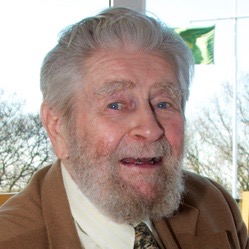News
Obituary: James Forrester
Monday 25 January 2016

Jim Forrester (photo), formerly Reuters overnight editor known affectionately as the Prince of Darkness, died at home in Edinburgh on Sunday aged 89.
He had been ailing for some time, his latest period in hospital beginning two weeks ago. He returned home on Wednesday at his own request.
A year ago, Forrester was in hospital for almost four months following a fall that exacerbated injuries sustained in an aircraft crash in 1945 when he was training as a pilot in the Royal Navy’s Fleet Air Arm. As he recalled later, he made a landing which would have been perfect had the aircraft only been much closer to the ground. “I didn’t know if I would live until next week,” he said.
After the crash he transferred to the army where he found discipline less demanding. During army service in 1946 he developed an illness which was cured by penicillin, for which he personally thanked Alexander Fleming, rector of Edinburgh University in the early 1950s. After the army he resumed studies at Edinburgh University, was active in a national Labour student body, and also studied at Glasgow University.
He worked briefly in Edinburgh in advertising sales, and also as a college lecturer in Cumbria where he was born and educated and where he met Beatrix Potter. He struggled in later years to square his memory of the sheep-breeder in stout farm boots with the image of the celebrated creator of the Peter Rabbit tales.
His journalistic career began with a flourish soon after he gave up the lecturing job to join The Scotsman. He was still living in Cumbria when a fire broke out at Windscale nuclear energy plant. Many of the press conferences were restricted to local media, and he knew many of the people associated with the plant.
His first published article was in The Spectator in 1949 and can still be read on the magazine's online archive. It compares the different visions for an atomic future held by physicist Niels Bohr and the organisers of an exhibition about Windscale, later to be renamed Sellafield.
Forrester joined Reuters in London in 1960. After 18 years as overnight editor, he was posted to Hong Kong where he remained on the Asian time zone's World Desk for five years.
Years later, he recalled how, during his role as overnight editor in London, a young correspondent in Berlin saw a huge build-up of military vehicles in the eastern sector and filed an urgent and alarming message.
When the reporter made contact shortly afterwards to ask why the story had not been transmitted, Forrester told him to look at a calendar. It was the day before May Day - by tradition, the day for big military parades.
He retired from Reuters in 1991, returning to live in his adopted home city of Edinburgh where he remained active, filing for Reuters on events as varied as the quest for the Lockerbie bomber to a cold and windy by-election campaign in Kincardine and Deeside.
A keen music lover, he was also a regular reviewer at the Edinburgh Festival.
Forrester’s astute publicity skills helped to establish the Indian Chef of the Year contest after its launch at the House of Commons in 1991 by Edwina Currie who had just resigned as a government minister.
Forrester’s wife Bertha was an opera and folk music lover, resulting in his becoming Reuters’ opera and music reporter on his undertaking that this would not encroach on his main role as overnight editor. For ten years until his transfer to Hong Kong they attended gala performances, every Royal Opera and English National Opera first night and most Welsh National Opera premieres.
Her passion for travel resulted in extensive driving tours on the Continent. Forrester himself had a long-standing desire to visit Czechoslovakia and on their first trip they made friends with a Czech writer. They were visiting him in Prague on the first anniversary of the Warsaw Pact invasion and Forrester had to help cover the massive demonstrations that ensued.
Not wishing to draw undue official attention to his host, Forrester asked him to name a local landmark where he could ask taxi drivers to drop him off in the evenings. After some days, he was picked up by authorities. The landmark building whose address he had been giving to taxi drivers turned out to be the headquarters of the secret police.
At the peak of the disturbances, Czech authorities called out the militia and three ranks of bayonet-wielding men closed off the foot of Wenceslas Square. Returning to the office, Bertha, a teacher, marched up to the first rank, said very loudly “Excuse me,” firmly brushed aside the fixed bayonets and walked through the rest to the Reuters office without a second glance.
A strong moral sense led them to found a UK branch of the charity SOS Children's Villages. He served as an unpaid and temporary chief executive of the British arm for ten years in the 1960s and 1970s.
She died in November 2012 aged 81.
Donald Armour, one of several former colleagues who kept in touch with him, said that although frail, Forrester had enormous spirit. “He regularly presided over the Reuterhacks’ lunches at the Arts Club here in Edinburgh, adding greatly to these occasions. He was a marvellous raconteur who enjoyed life despite the restrictions of age and infirmity, and he was a great host at his house in the Trinity district of Edinburgh, with a wealth of anecdote and reminiscence about those days back on Fleet Street.”
Robert Powell, another former colleague, said: “Jim always used to greet me with the latest news about who among his old Reuters friends and colleagues had recently died - with something of a playful glint in his eye, since he had managed to survive them.” ■
- « Previous
- Next »
- 868 of 2173